MED NEWS 02/2021
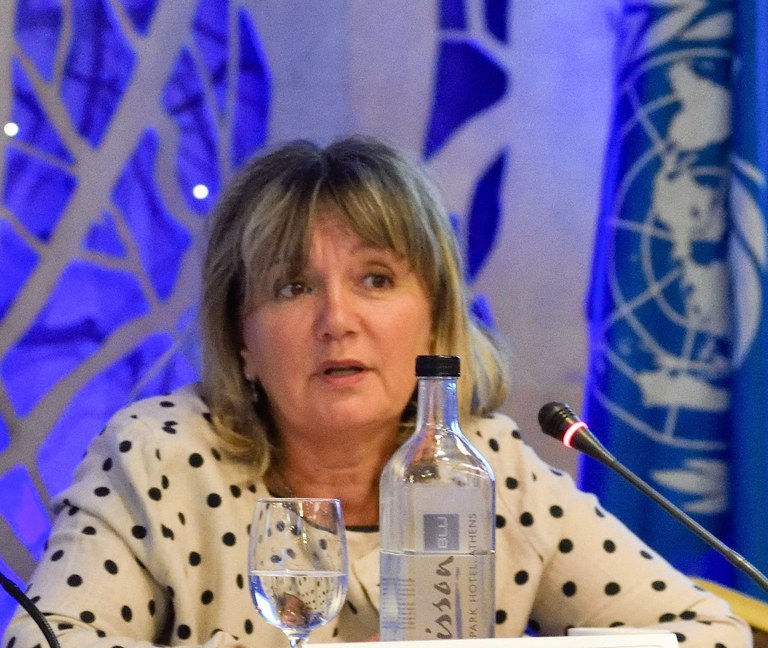 Editorial
Editorial
By Tatjana Hema, Coordinator of the UNEP/MAP-Barcelona Convention Secretariat
Continuity, enhanced integration and renewed commitment
On 1 July 2021 I assumed my duties of Coordinator of the Mediterranean Action Plan (MAP), taking over from Gaetano Leone, who recently retired after seven years of outstanding service at the helm of the UNEP/MAP-Barcelona Convention Secretariat.
As many of you know, I am not new to MAP. I have worked in the Secretariat for several years and in various positions. I see in my latest appointment by the UNEP Executive Director an expression of appreciation for the work that the entire MAP-Barcelona Convention Secretariat, including the Regional Activity Centres (RACs), has competently delivered. I also see a clear message on the importance of continuity. As I embark on this new professional journey, I am determined to draw upon the leadership of the Contracting Parties and build on what UNEP/MAP has achieved with a view to addressing the triple crisis of climate change, biodiversity loss and pollution that the Mediterranean is grappling with.
The goal is to divert current trajectories towards more sustainable and resilient paths. The new UNEP/MAP Medium-Term Strategy 2022-2027, to be examined for adoption this December at the 22nd Meeting of the Contracting Parties (COP 22) in Antalya, Turkey, will guide our collective efforts to achieve this crucial mission in line with UNEP’s mandate and within the framework of the global agenda and the commitment that it has generated.
I am fully aware of the complex nature of the issues in hand. Luckily, we have a robust platform for a stronger collective effort. UNEP/MAP has delivered a vast body of assessments, and devised strategies, action plans and concrete measures to help Contracting Parties accelerate the transition to sustainability across a wide thematic spectrum: from Sustainable Consumption and Production (SCP)—as the linchpin of circular economies—to curbing marine pollution and expanding the protection of marine and coastal species to achieve Good Environmental Status. The vision is clear, but the journey ahead is challenging.
Fostering political commitment is essential to the transformational changes needed in all sectors. This will be among the priorities that I will be pursuing in my new role. Implementation and enforcement of the Barcelona Convention and its Protocols, breaking the silos through greater integration at all levels, and effective collaboration and outreach are critical to the achievement of the 2030 Agenda for Sustainable Development and its Sustainable Development Goals (SDGs) in the Mediterranean region.
I will strive for a nimble, efficient and forward-looking UNEP/MAP-Barcelona Convention system that responds adequately to existing and emerging challenges in the Mediterranean and serves the Contracting Parties to the Barcelona Convention and its Protocols at the highest standards.
I am confident that COP 22—the first meeting of the Contracting Parties to take place after the global pandemic rose on the Mediterranean horizon—will serve as a new push for effective multilateralism and coordinated action among Mediterranean countries and the European Union.
Gender equality and enhancing the way we listen to and work with youth in the Mediterranean will also receive adequate attention. As we step up efforts to spur a post-COVID green renaissance in the Mediterranean, we must and will do more to ensure that no one is left behind in the delivery of the UNEP/MAP Programme of Work and the projects that we implement with our partners.

FOURTH MEETING OF THE MEDITERRANEAN NETWORK OF LAW ENFORCEMENT OFFICIALS RELATING TO MARPOL WITHIN THE FRAMEWORK OF THE BARCELONA CONVENTION (MENELAS)
Operational discharges at sea by ships are regulated mainly under the MARPOL Convention. Numerous illicit ship pollution discharges can still be observed at sea, requesting action at the regional level for detecting and prosecuting such ...
Operational discharges at sea by ships are regulated mainly under the MARPOL Convention. Numerous illicit ship pollution discharges can still be observed at sea, requesting action at the regional level for detecting and prosecuting such infringements.
Since the adoption of the “Prevention and Emergency Protocol” in 2002, REMPEC has been working towards setting-up a sound basis for the development of marine pollution surveillance and monitoring systems in the region. In 2013, the Mediterranean Network of Law Enforcement Officials relating to MARPOL within the framework of the Barcelona Convention (MENELAS) was established by the Contracting Parties to the Barcelona Convention to facilitate cooperation between its members in order to improve the enforcement of the international regulations regarding discharges at sea from ships as laid down in the MARPOL Convention.
The Fourth Meeting of MENELAS financed by the Mediterranean Trust Fund (MTF) was organised remotely by REMPEC from 21 to 22 April 2021.
The meeting gathered over 50 participants from 17 Contracting Parties to the Barcelona Convention, namely Albania, Bosnia and Herzegovina, Croatia, Cyprus, Egypt, France, Greece, Israel, Libya, Malta, Montenegro, Morocco, Spain, the Syrian Arab Republic, Tunisia, Turkey, and the European Union, as well as representatives from relevant regional and international organisations, namely the Secretariats of the United Nations Environment Programme / Coordinating Unit for the Mediterranean Action Plan - Barcelona Convention (UNEP/MAP), the International Oil Pollution Compensation Funds (IOPC Funds), INTERPOL, the OSPAR Commission, the Bonn Agreement, the Baltic Marine Environment Protection Commission (HELCOM) and the RAMOGE Agreement as well as the Chair of the North Sea Network of Investigators and Prosecutors (NSN) and President of the Network of Prosecutors on Environmental Crime in the Baltic Sea Region (ENPRO), and representatives from the European Maritime Safety Agency (EMSA) and the MedFund.
The Meeting agreed upon a set of conclusions and recommendations paving the way towards the finalisation of:
- a decision to apply, across the Mediterranean region, criteria for a common minimum level of fines for each offense provided for under the Annexes to MARPOL; and
- a common marine oil pollution detection/investigation report, to facilitate exchanges between Mediterranean coastal states and support judicial procedures.
The Meeting also agreed to explore how to develop the modalities of possible creation and operation of a regional “Blue Fund”, which could be made up of part of the fines from illicit ship pollution discharges collected by Mediterranean coastal States.
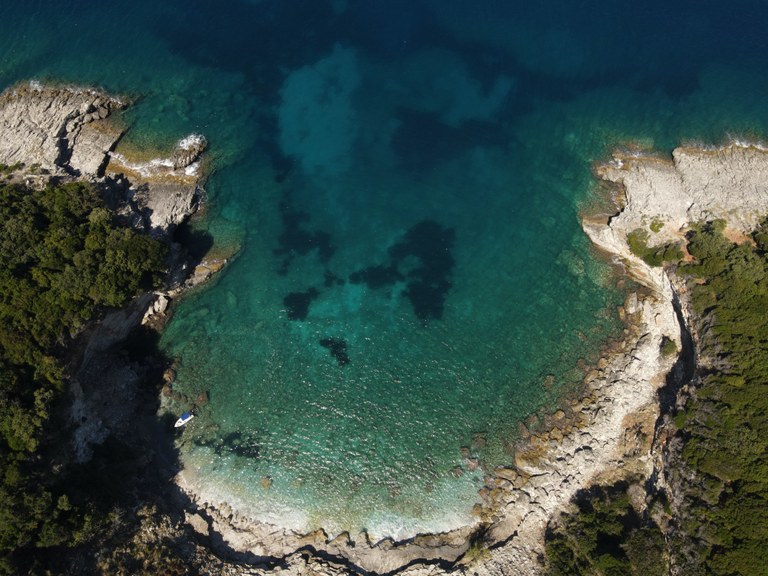
THE MCSD CALLS FOR A GREEN RENAISSANCE IN THE MEDITERRANEAN
Considerable changes have occurred in the Mediterranean region, not least a disruptive COVID-19 pandemic that has caused suffering and destruction in its wake, with deep ramifications affecting both the environment and socio-economic systems. The pandemic has put hard-won gains in the achievement of the Sustainable Development Goals (SDGs) in jeopardy.
Considerable changes have occurred in the Mediterranean region, not least a disruptive COVID-19 pandemic that has caused suffering and destruction in its wake, with deep ramifications affecting both the environment and socio-economic systems. The ...
Considerable changes have occurred in the Mediterranean region, not least a disruptive COVID-19 pandemic that has caused suffering and destruction in its wake, with deep ramifications affecting both the environment and socio-economic systems. The pandemic has put hard-won gains in the achievement of the Sustainable Development Goals (SDGs) in jeopardy. This was one of the central issues that the 19th Meeting of the Mediterranean Commission on Sustainable Development (MCSD), the inclusive advisory body established under the Barcelona Convention (Article 4), pored over during three days (7-9 June 2021) of reflections and debate.
Hosted virtually by Slovenia, the meeting reviewed progress in the implementation of the Mediterranean Strategy for Sustainable Development (MSSD), a region-specific blueprint for the achievement of the 2030 Agenda and the 17 SDGs that the Contracting Parties adopted in December 2015. In his opening statement, H.E. Andrej Vizjak, Minister of the Environment and Spatial Planning of Slovenia, invited the MCSD to formulate clear proposals for a green renaissance in the Mediterranean.
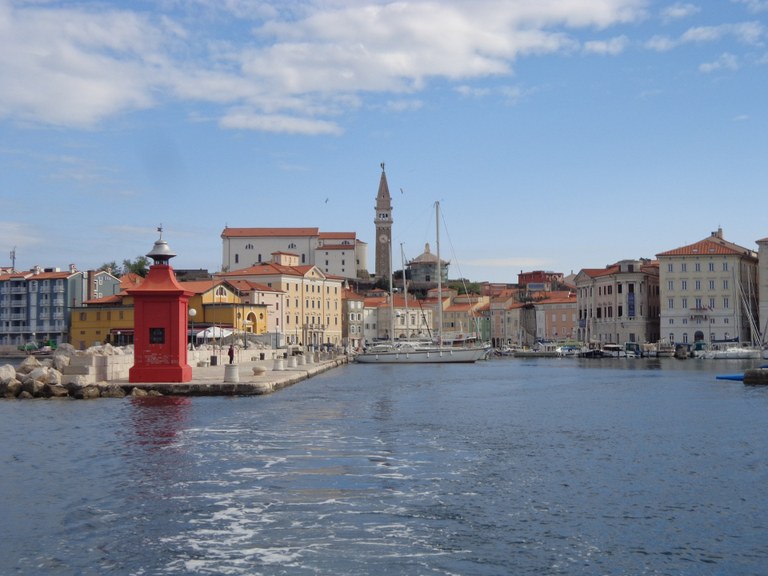
SLOVENIA HOSTS THE 19TH MEETING OF THE MEDITERRANEAN COMMISSION ON SUSTAINABLE DEVELOPMENT
More than fifty Members and Observers are taking part in the 19th Meeting of the Mediterranean Commission on Sustainable Development (MCSD), which went underway on 7 June 2021.
More than fifty Members and Observers are taking part in the 19th Meeting of the Mediterranean Commission on Sustainable Development (MCSD), which went underway on 7 June 2021. The three-day meeting virtually hosted by Slovenia will examine a report ...
More than fifty Members and Observers are taking part in the 19th Meeting of the Mediterranean Commission on Sustainable Development (MCSD), which went underway on 7 June 2021. The three-day meeting virtually hosted by Slovenia will examine a report on sustainable development activities carried out from June 2019 - May 2021, and review progress in the implementation of the Mediterranean Strategy for Sustainable Development. A roundtable is also scheduled to take place on 8 June to discuss the “achievement of the SDGs and the transition towards a sustainable blue economy for a post-COVID green renaissance in the Mediterranean”.
The MCSD was established twenty-five years ago in line with Article 4 of the Barcelona Convention as an advisory body to the Contracting Parties to assist them in their efforts to integrate environmental issues in their socio-economic programmes and to promote sustainable development policies in the region and at national level.
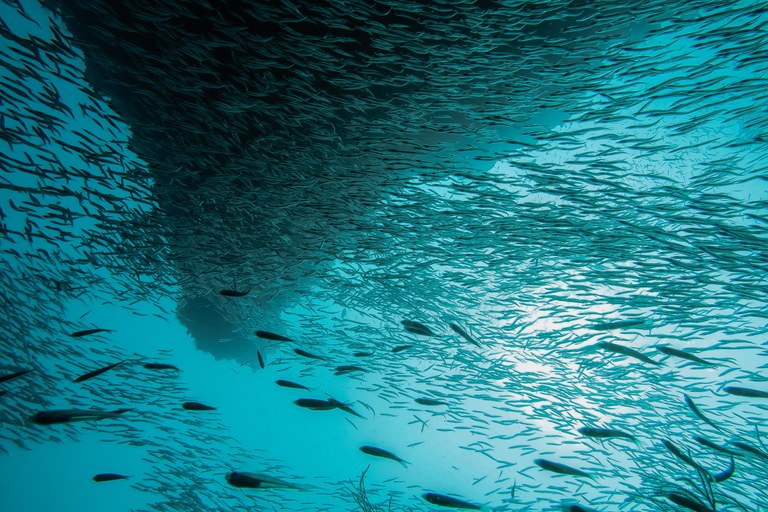
BUILDING THE KNOWLEDGE BASE WE NEED TO ENSURE A HEALTHY MEDITERRANEAN
The implementation of the EU-funded EcAp MED III project is proceeding well despite restrictions linked to the COVID-19 pandemic, the first Steering Committee convened on 28 April 2021 (online) heard.
The implementation of the EU-funded EcAp MED III project is proceeding well despite restrictions linked to the COVID-19 pandemic, the first Steering Committee convened on 28 April 2021 (online) heard.
The project, which is executed by the ...
The implementation of the EU-funded EcAp MED III project is proceeding well despite restrictions linked to the COVID-19 pandemic, the first Steering Committee convened on 28 April 2021 (online) heard.
The project, which is executed by the Mediterranean Action Plan of the UN Environment Programme (UNEP/MAP), aims to assist Southern and Eastern Mediterranean countries to implement the Integrated Monitoring and Assessment Programme and related assessment criteria for the Mediterranean Sea and Coast (IMAP), and to contribute to the preparation and delivery of the 2023 Mediterranean Quality Status Report (2023 MED QSR), a key UNEP/MAP knowledge product, the preparation of which is mandated by the Contracting Parties to the Barcelona Convention and its Protocols. Read more.
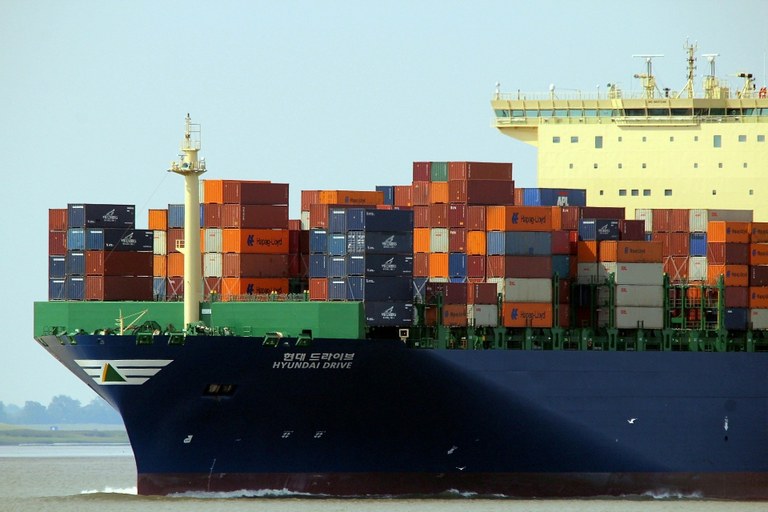
EDGING CLOSER TO A BREAKTHROUGH ON CLEANER SHIPPING IN THE MEDITERRANEAN
Meeting online on 27-28 April 2021, more than 50 participants representing 20 (out of the 22) Contracting Parties to the Barcelona Convention agreed on a set of conclusions and recommendations that pave the way for the possible designation of the ...
Meeting online on 27-28 April 2021, more than 50 participants representing 20 (out of the 22) Contracting Parties to the Barcelona Convention agreed on a set of conclusions and recommendations that pave the way for the possible designation of the Mediterranean Sea, as a whole, as an “Emission Control Area for Sulphur Oxides (Med SOx ECA) pursuant to Annex VI to the International Convention for the Prevention of Pollution from Ships (MARPOL)”. The endeavour is part of the implementation of the Regional Strategy for Prevention of and Response to Marine Pollution from Ships (2016-2021). Read more
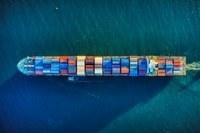
A SUCCESSFUL INTER-GOVERNMENTAL MEETING BOOSTING THE PREVENTION OF AND RESPONSE TO MARINE POLLUTION FROM SHIPS IN THE MEDITERRANEAN
Maritime activities are essential to transport goods and passenger through the Mediterranean and represents important drivers of marine pollution in the basin.
Maritime activities are essential to transport goods and passenger through the Mediterranean and represents important drivers of marine pollution in the basin. According to REMPEC (2021) Study on Trends and Outlook on Marine Pollution, Maritime ...
Maritime activities are essential to transport goods and passenger through the Mediterranean and represents important drivers of marine pollution in the basin. According to REMPEC (2021) Study on Trends and Outlook on Marine Pollution, Maritime Traffic and Offshore, a little more than 24% of the global fleet of ships called ports or passed through the Mediterranean in 2019, while projections indicate that the future number of port calls could decrease (by -11.2% in 2050), while the number of transits could increase (+38.2% in 2050), confirming the role of the Mediterranean within the global maritime trade. Maritime activities generate a variety of pressures on the marine environment, i.e., loss or discharge of solid wastes contributing to marine litter pollution, emissions of gaseous pollutants and particles in the atmosphere, emission of continuous underwater noise, release of oil and other contaminants in the marine waters, introduction of invasive species though ballast water and hull fouling.
To address the impacts of maritime activities on the marine environment, the Fourteenth Meeting of the Focal Points of the Regional Marine Pollution Emergency Response Centre for the Mediterranean Sea (REMPEC) (31 May - 2 June), which was attended by focal points from 20 (out of 21) Mediterranean littoral countries examined a set of strategic and technical documents.
Joint and coordinated proposal on the designation of the Med SOX ECA endorsed:
A proposal to designate the entire Mediterranean Sea as sulphur oxides (SOx) emission control area (ECA) under the International Convention for the Prevention of Pollution from Ships (MARPOL) has been endorsed by the meeting of Mediterranean country representatives.
A Mediterranean ECA would imply a reduction to 0.1% m/m for the sulphur content of fuel oil used on board ships in the area, against the mandatory global limit of 0.50%.
The Mediterranean is a key route for shipping, with both internal shipping traffic and acting as an through route for ships travelling along the Suez-Gibraltar route and entering the basin from the Bosporus Strait. Cutting the sulphur limit would therefore have a significant impact, improving air quality for entire Mediterranean Sea, particularly coastal areas.
The draft joint and coordinated proposal on the designation of the Med SOX ECA was endorsed by the Fourteenth Meeting of the Focal Points of REMPEC.
REMPEC, administered by the International Maritime Organization (IMO) in collaboration with the Secretariat of the Mediterranean Action Plan of the United Nations Environment Programme (UNEP/MAP), assists Mediterranean coastal states to build national capacities to prevent marine pollution from ships and act in the event of major incidents. REMPEC was established under the MAP to support environmental protection of the Mediterranean Sea, adopted by Contracting Parties to the Barcelona Convention for the protection of the Mediterranean.
The next step in designating the Med SOX ECA is the submission of the draft joint proposal to the MAP Focal Point Meeting (scheduled for 13-17 September 2021). It will then be submitted for adoption to the 22nd Meeting of the Contracting Parties to the Barcelona Convention and its Protocols (COP 22) (scheduled to meet in Antalya, Turkey, 7 to 10 December 2021).
Subject to its adoption by COP 22, the proposal would be submitted to IMO’s Marine Environment Protection Committee (MEPC). The MEPC would then consider the proposed Med SOX ECA for approval and subsequent adoption.
There are currently four other SOX ECAs worldwide: The Baltic Sea area; the North Sea area; The North American area; and the United States Caribbean Sea area.
Mediterranean Strategy endorsed
The REMPEC focal points meeting also endorsed the Mediterranean Strategy for the Prevention, Preparedness, and Response to Marine Pollution from Ships (2022-2031). This has a vision to create "A clean and healthy Mediterranean marine and coastal environment with a sustainable and pollution free maritime sector, supported by a rigorous enforcement system and strengthened multi-sectoral cooperation, for the benefit of present and future generations".
Seven strategic objectives for the next ten years are set out:
- prevent, prepare for, and respond to operational, illegal and accidental oil and HNS pollution from ships
- promote and support the development and implementation of innovative global solutions to mitigate and respond to climate change
- reduce and monitor air emissions from ships to a level that is not harmful to the marine environment, or the health of the coastal population of the Mediterranean
- prevent and reduce litter (in particular plastic) entering the marine environment from ships, in order to limit the environmental, health, and socio-economic impact of marine litter in the Mediterranean
- eliminate the introduction of non-indigenous species by shipping activities
- achieve a well-managed safe and pollution free Mediterranean, with integrated marine spatial planning and designation of special areas, where shipping activity has a limited impact upon the marine environment
- identify and understand collectively emerging issues related to pollution from ships in the Mediterranean, and define required actions to address issues identified
Ballast Water Management Strategy endorsed
The Meeting also endorsed the Ballast Water Management Strategy for the Mediterranean Sea (2022-2027). This is aimed at establishing a framework for a regional harmonised approach in the Mediterranean on ships’ ballast water control and management, consistent with the requirements and standards of IMO’s Ballast Water Management Convention.
The latter will be considered by the next Meeting of the UNEP/MAP Focal Points (Athens, Greece, mid-September 2021) for approval, and by COP22 for their adoption.
Guidance and manual adopted
The meeting adopted:
Guidance Document for the identification and designation of Particularly Sensitive Sea Areas in relation to Specially Protected Areas of Mediterranean Importance aimed at assisting Mediterranean countries to ascertain whether there are maritime areas within their jurisdiction which need the protection afforded by their designation as PSSAs or not, and providing guidance on the preparation of a submission to IMO for designation of a PSSA.
Marine HNS response manual - Bonn Agreement, HELCOM, REMPEC - developed through an inter-regional effort, including the participation of REMPEC, the Bonn Agreement for the Greater North Sea and its approaches and the Helsinki Commission (HELCOM) for the Baltic Sea. The objective of this Manual is to provide operational guidance for first responders and decision-makers during a maritime incident at sea or in port involving HNS. It will be submitted to IMO’s Sub-Committee on Pollution Prevention and Response (PPR 9), to contribute to the “Development of an operational guide on the response to spills of Hazardous and Noxious Substances (HNS)”.
Those are the results of a collaborative and consultative approach with all 22 Contracting Parties to the Barcelona Convention, through the established network of national focal points responsible for policies related to marine pollution from maritime activities and measures for combating it, and with REMPEC Partners.
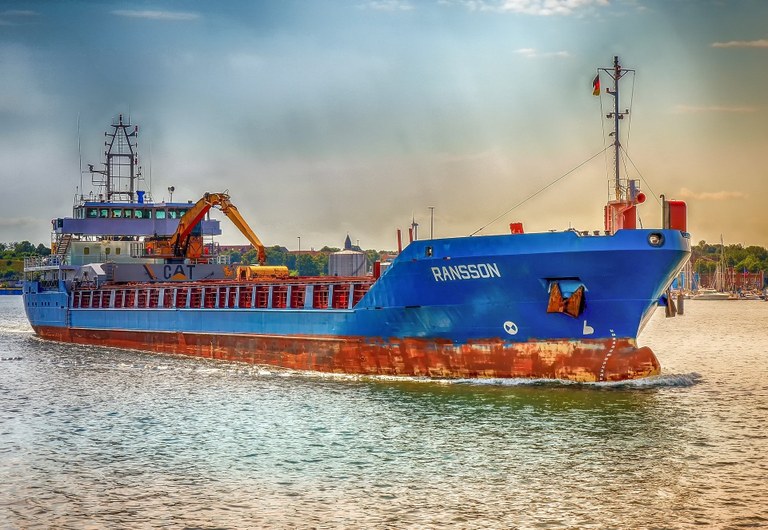
REGIONAL EXPERT MEETING ON THE POSSIBLE DESIGNATION OF THE MEDITERRANEAN SEA, AS A WHOLE, AS AN EMISSION CONTROL AREA FOR SULPHUR OXIDES (MED SOX ECA) PURSUANT TO MARPOL ANNEX VI
Air emissions from ships are a contributor to the overall air quality degradation in the Mediterranean region, and more specifically in the Mediterranean coastal States. Sulphur Oxides (SOx) emissions can cause acid rain and can combine with other ...
Air emissions from ships are a contributor to the overall air quality degradation in the Mediterranean region, and more specifically in the Mediterranean coastal States. Sulphur Oxides (SOx) emissions can cause acid rain and can combine with other pollutants to generate fine particles, which can lead to respiratory and cardiovascular diseases including childhood asthmas, as well as reduced life expectancy and increase premature deaths. Cleaner air means better health, including a reduced vulnerability to COVID-19—known to take acute forms when the virus encounters underlying conditions—and other ailments of its ilk.
In this context, the Regional Marine Pollution Emergency Response Centre for the Mediterranean Sea (REMPEC) remotely held the Regional Expert Meeting on the possible designation of the Mediterranean Sea, as a whole, as an Emission Control Area for Sulphur Oxides (Med SOx ECA) pursuant to Annex VI to the International Convention for the Prevention of Pollution from Ships (MARPOL) on 27-28 April 2021. This meeting, which was financed by the Mediterranean Trust Fund (MTF), was organised in cooperation with the Barcelona Convention Secretariat - Coordinating Unit for the Mediterranean Action Plan of the United Nations Environment Programme (UNEP/MAP) and its Components, notably the Mediterranean Pollution Assessment and Control Programme (MED POL) as well as the Plan Bleu Regional Activity Centre (PB/RAC).
The Regional Expert Meeting on the possible designation of the Med SOx ECA gathered over 50 participants from 20 out of 22 Contracting Parties to the Barcelona Convention, as well as representatives from relevant regional and international organisations. The meeting was convened as part of the implementation of Decision IG.24/8 on the Road Map for a Proposal for the Possible Designation of the Mediterranean Sea, as a whole, as an Emission Control Area for Sulphur Oxides Pursuant to MARPOL Annex VI (“the road map”).
The meeting reviewed the outcome of the further work of the SOx ECA(s) Technical Committee of Experts as well as agreed upon a set of conclusions and recommendations prior to their submission to the Fourteenth Meeting of the Focal Points of REMPEC to be held remotely from 31 May to 2 June 2021. In particular, the meeting:
- was satisfied that the necessary knowledge was gathered, the necessary studies were prepared, and the initial draft submission to the IMO for a proposal for the possible designation of the Med SOx ECA was updated, in line with the road map and in accordance with the Terms of Reference developed by the Secretariat and agreed by the SOx ECA(s) Technical Committee of Experts;
- was of the opinion that the carrying out of the further studies enabled to more fully address the criteria and procedures for designation of emission control areas laid down in Appendix III to MARPOL Annex VI;
- considered that the further work of the SOx ECA(s) Technical Committee of Experts was successfully completed within the approved timeline of the road map; and
- agreed, on the basis of the outcome of the further work of the SOx ECA(s) Technical Committee of Experts, to take the finalised draft submission to the IMO, as a basis for the possible submission of a joint and coordinated proposal for the designation of the proposed Med SOx ECA to the IMO.

MONITORING THE IMPACT OF THE OFFSHORE ACTIVITIES IN THE ENVIRONMENT
Potential accidents caused by increasingly intense offshore activities could lead to long term adverse consequences on the fragile ecosystems and biodiversity of the Mediterranean Sea because of its enclosed nature and special hydrodynamics. In this ...
Potential accidents caused by increasingly intense offshore activities could lead to long term adverse consequences on the fragile ecosystems and biodiversity of the Mediterranean Sea because of its enclosed nature and special hydrodynamics. In this context it could impact negatively the economies of Mediterranean coastal States, in particular the tourism and fisheries sectors. Therefore, the Contracting Parties to the Barcelona Convention adopted in 2016 the Mediterranean Offshore Action Plan in the framework of the Protocol for the Protection of the Mediterranean Sea against Pollution resulting from Exploration and Exploitation of the Continental Shelf and the Seabed and its Subsoil (Decision IG.22/3).
The Regional Marine Pollution Emergency Response Centre for the Mediterranean Sea (REMPEC) organised between 3 and 4 June 2021 the Online Third Meeting of the Barcelona Convention Offshore Oil and Gas Group (OFOG) Sub-Group on the Environmental Impact in coordination with the United Nations Environment Programme/Mediterranean Action Plan (UNEP/MAP). The meeting gathered representatives of Contracting Parties and Observers representing relevant international organisations and UNEP/MAP as well as relevant regional and international inter-governmental organisations, non-governmental organizations and the private sector.
The OFOG meeting examined and provided further guidance on the key outcomes of activities carried out in the current biennium, in relation to the implementation of the Mediterranean Offshore Action Plan. More specifically, this technical meeting reviewed the revised Draft Mediterranean Offshore Guidelines for the Conduct of Environmental Impact Assessment (EIA), the amended Annexes to the Mediterranean Offshore Protocol, and the activities proposed in the Programme of Work for the biennium 2022-2023. The latter will now be submitted for approval by the next Meeting of the UNEP/MAP Focal Points (Athens, Greece, 14-17 September 2021) and for adoption by the Twenty-Second Ordinary Meeting of the Contracting Parties to the Barcelona Convention and its Protocols (COP 22, Antalya, Turkey, 7-10 December 2021).
The comprehensive plan of actions and related resource mobilisation strategy prepared by the Secretariat and welcomed by the Mediterranean countries and the partners will ensure the sustainability of the system to meet the objectives of the Action Plan. Best practices and lessons learnt were shared among the Contracting Parties to the Offshore Protocol, the relevant regional and international inter-governmental organisations, and MAP Partners.
The OFOG was established by COP to serve as an advisory body to the Contracting Parties to the Barcelona Convention as regards the Offshore Protocol. OFOG meets every two years to assist in the identification of best practices and to ensure a monitoring and assessment of the impacts of these activities consistent with the overall policy adopted within the Mediterranean Action Plan.
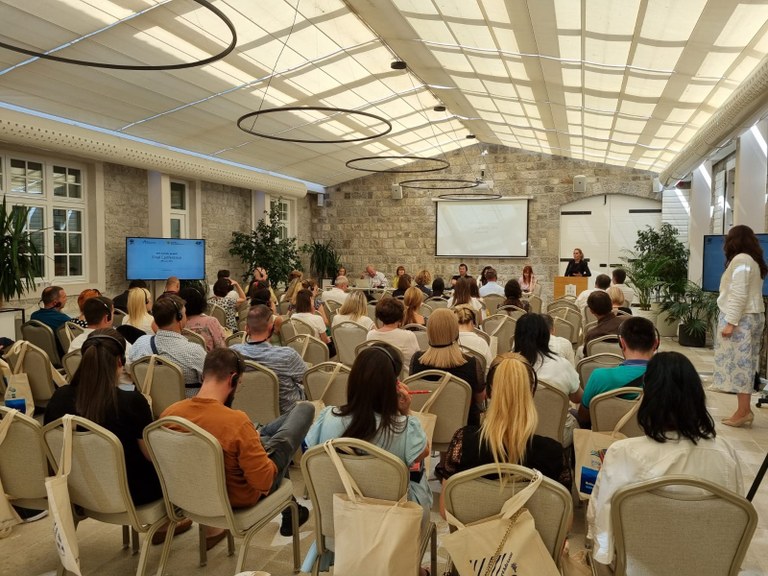
GEF ADRIATIC: SUB-REGIONAL IMPACT AND WIDER BENEFITS
On 28 June 2021 the Ministry of Ecology, Spatial Planning and Urbanism of Montenegro hosted the final conference of the GEF Adriatic Project, funded by the GEF (under the “International Water” and “Biodiversity” focal areas) and implemented by the ...
On 28 June 2021 the Ministry of Ecology, Spatial Planning and Urbanism of Montenegro hosted the final conference of the GEF Adriatic Project, funded by the GEF (under the “International Water” and “Biodiversity” focal areas) and implemented by the UNEP/MAP Coordinating Unit and the Regional Activity Centres PAP/RAC and SPA/RAC. Representatives of the relevant national institutions of Albania and Montenegro, the two countries where the project was implemented for three years, attended the conference held in the Montenegrin city of Herceg Novi to take stock of what has been achieved.
The project bolstered national efforts to implement the Ecosystem Approach in the Adriatic sub-region of the Mediterranean. This approach considers the relationships between all the different human interactions with the marine and coastal areas and the ecosystems on which they depend. These interactions are then incorporated into an overall plan for sustainable development using a tool know as Marine Spatial Planning (MSP).
Within the UNEP/MAP-Barcelona Convention system, the Ecosystem Approach refers to a roadmap (with milestones and a timetable) leading to the fulfillment of the vision of "a healthy Mediterranean with marine and coastal ecosystems that are productive and biologically diverse for the benefit of present and future generations". As part of this roadmap, the Contracting Parties have adopted eleven Ecological Objectives that address key elements of the Mediterranean marine and coastal environment. These objectives constitute the backbone of a harmonized regional system that allows UNEP/MAP and the Contracting Parties to take the pulse of Mediterranean ecosystems: the Integrated Monitoring and Assessment Programme of the Mediterranean Sea and Coast and Related Assessment Criteria (IMAP).
Adopted by the Contracting Parties in 2016, IMAP has transformed the way in which monitoring and assessment of the status of the marine and coastal environment are conducted. UNEP/MAP Components, including PAP/RAC and SPA/RAC support Mediterranean countries in this endeavor.
“We received a considerable boost to our national conservation obligations under the Barcelona Convention by working with GEF Adriatic, which also helped develop our EU candidacy requirements. We have significantly increased our national capacities to assess, monitor and manage our marine resources in Montenegro’s first ever large-scale marine spatial planning process,” said Ivana Stojanovic of the Ministry of Ecology, Spatial Planning and Urbanism of Montenegro.
Zamir Dedej of the National Agency for Protected Areas of Albania, Ministry of Tourism and Environment of Albania, said: “Our marine environment is a priceless national resource, and we need to do more to preserve it. The GEF Adriatic project proved to be a great opportunity to begin managing the Adriatic with the integrated overall vision such an aim requires. The marine surveys and monitoring that have taken place provide an excellent foundation for future Marine Spatial Planning in Albania and beyond.”
The project strengthened national capacity for sub-regional marine management through targeted demonstration of successful tools and practices in both countries. Marine field surveys aligned with IMAP were implemented, along with the preparation of the first integrated monitoring programmes. Science-based assessments towards the achievement of Good Environmental Status were also conducted in line with IMAP INFO system, the information system underpinning the exchange of data and information among the Contracting Parties to the Barcelona Convention. In Montenegro, a national process of MSP was initiated with the project’s support.
The project has fostered collaboration by bringing a wide range of actors (government, academia, business and civil society) together to address the impact of socio-economic activities, including those related to the blue economy, on natural systems.
The deployment of research initiatives to enhance the collective understanding of environmental degradation processes, including those driven by non-indigenous species, marine litter, pollution, and climate change, provides a basis for targeted marine protection initiatives and more effective long-term MSP. The GEF Adriatic project has notably spurred plans for the development of a new marine research centre in Albania.
“The GEF Adriatic project has had a powerful demonstrative impact that will reverberate well beyond the Adriatic, particularly in promoting Marine Spatial Planning processes based on the Ecosystem Approach,” Tatjana Hema, Acting Coordinator, UNEP/MAP-Barcelona Convention Secretariat said. “Ensuring Good Environmental Status in the Mediterranean Sea and coasts, supporting the restoration of ecosystems and ensuring that everyone can benefit from their services fairly and sustainably is at the core of our long-standing partnership with the GEF,” Ms. Hema added.
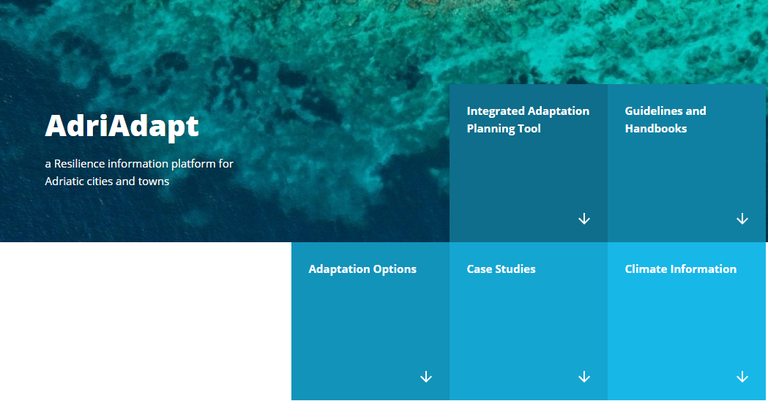
KNOWLEDGE PLATFORM ON CLIMATE CHANGE ADAPTATION LAUNCHED
During May and June, final activities of the Interreg AdriAdapt project were carried out. UNEP MAP’s PAP/RAC, together with Croatian partners of the Project, held the final conference "Climate is changing, and so should we!"for Croatian audience on ...
During May and June, final activities of the Interreg AdriAdapt project were carried out. UNEP MAP’s PAP/RAC, together with Croatian partners of the Project, held the final conference "Climate is changing, and so should we!"for Croatian audience on 11 May, while Italian partners met the day after. Final conference of the AdriAdapt Project was held on 9 June named “Knowledge for local resilience”, and unlike previous two that were held in national languages, this one was held in English.
Interreg AdriAdapt project is a joint effort of six Italian and five Croatian partners with the aim of promoting local and regional climate resilience through development of the knowledge platform needed to identify appropriate options for adaptation to climate change and related planning. AdriAdapt project is funded by the European Union from the European Regional Fund.
Final online events in May and June brought together representatives of local and regional authorities, development agencies and relevant centres and concerned public. Participants had the opportunity to learn about ways in which decision makers can (re)strengthen the resilience and adaptation of their counties/cities/municipalities to the climate change impacts. In addition to the idea and successful initiatives, an adaptation knowledge platform (adriadapt.eu) was presented, as well as various funding opportunities.
All materials on the adriadapt.eu platform are also available in English, and so can be used and capitalized by all the Mediterranean countries.
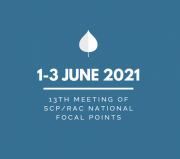
OVERVIEW OF THE SCP/RAC NATIONAL FOCAL POINTS MEETING
On 1-3 June 2021, SCP/RAC convened its National Focal Points for their 13th Meeting, held online.
The main objective of this meeting was to inform the National Focal Points of the Regional Activity Centre for Sustainable Consumption and Production ...
On 1-3 June 2021, SCP/RAC convened its National Focal Points for their 13th Meeting, held online.
The main objective of this meeting was to inform the National Focal Points of the Regional Activity Centre for Sustainable Consumption and Production (SCP/RAC) on the ongoing and future activities of the Centre and to review on SCP/RAC ‘s activities in compliance with the Programme of Work 2020-2021 adopted at the COP of the Barcelona (COP21) held in Napoli in December 2019.
The Focal Points also discussed and approved important topics in view of the next COP of the Barcelona Convention to be held in December 2021 in Antalya (COP22).
Highlights of the active discussion included key activities developed during the biennium 2020-2021:
The Midterm evaluation of the Regional Action Plan on Sustainable Consumption and Production (SCP-RAC)
The SCP-RAC is the first intergovernmental agreement in the Mediterranean basin to establish a regional action framework from 2016 to 2027 to promote the shift towards a more sustainable and circular economy. Six years after its adoption by the Contracting Parties to the Barcelona Convention, SCP/RAC carried out a mid-term evaluation to assess the progress made. The evaluation highlighted that there is still a need to intensify efforts towards SCP and circular economy. It also emphasized the role of EU-funded initiatives like SwitchMed, as well as other ENI-CBC-Med or InterregMed projects, play in the implementation of the SCP-RAP activities in the Region.
The SCP Action Plan addresses key human activities which have an impact on the Mediterranean marine and coastal environment. It defines common objectives and identifies actions guiding the implementation of SCP in four priority areas namely Food, fisheries and agriculture; Goods manufacturing; Tourism and Housing and construction. These areas are the main causes of pollution generation and environmental pressures in the region. The National Focal Points supported the recommendations made, suggesting not to add new sectors like transport, energy or logistics as the current sectors of the SCP Regional Action Plan are extremely relevant for SCP and circular economy, therefore efforts should be centred on these.
Updated list of SCP indicators
In order to monitor the progress on the SCP-RAP, a series of indicators were developed to analyze the state of Sustainable Consumption and Production in Mediterranean countries.
With the support of SwitchMed, the list of SCP indicators has now been reviewed (adding new indicators in line with the SDGs, for example), its database updated and factsheets for each of the selected indicators are being prepared. The indicators – which encompass six thematic areas and a set of macro-indicators – were selected among existing international indicators or new indicators for the Sustainable Development Goals (SDGs).
The National Focal Points welcomed the new list and the inclusion of new indicators and also expressed their satisfaction for the joint work with Plan Bleu/ Regional Activity Centre that culminated with the integration of the SCP indicators’ list and related factsheets within the Mediterranean Observatory for Environment and Sustainable Development.
The guidelines on tackling single-use plastic products in the Mediterranean
On the 2nd day of the meeting, attention was drawn to SCP/RAC's work regarding the prevention of Marine Litter and Plastic Pollution with the presentation and the review of the Guidelines on Tackling single-use plastic products in the Mediterranean.
Prior to this, Ms Hara Xirou, expert from Eunomia Research & Consulting IKE exposed the main findings of the information document prepared for the guidelines drafting. This info doc provides baseline information on consumption, end of life management & impacts associated with beverage bottles, including caps and lids; food containers; straws & cigarette filters in Egypt, Morocco, Montenegro & Greece.
Once finalized, the guidelines will put forward for adoption at the Barcelona Convention COP22 in December.
The quality of the document has been recognized by the National Focal Points who expressed their satisfaction on the analysis on the effect of different policy measures in a Mediterranean context and the relevance of such guidelines to support the Regional Plan on Marine Litter Management.
Regional policy measures to support green and circular economy businesses
On the last day of the meeting and prior to the redaction of conclusion and recommendations, a last but not least important item was presented to the National Focal Points. The policy team presented the work carried out for the preparation of a Set of Regional Measures to Support the Development of Green and Circular Businesses and to Strengthen the Demand for more Sustainable Products, following COP21 Decision IG. 24/13. They also presented the consolidated draft of the proposed Regional measures, reviewed after its revision by the National Experts nominated by SCP/RAC Focal Points to support the process.
During the last COP21, Mediterranean countries requested the preparation of a “set of regional measures to support the development of green and circular businesses and strengthen the demand for more sustainable products”. After a group of experts analyzed the situation in each of the 21 countries and a regional consultation took place with many stakeholders, SCP/RAC published the “Regional summary of policy recommendations”. This was the basis for the preparation of a set of 12 regional measures that will be presented at the COP22 for adoption by the Contracting Parties.
The Switchers Support Programme and the Switchers.org platform
The meeting was the occasion to present the recent success of the Switchers Support Programme, that, thanks to EU and UNEP/MAP funding, has gathered more than 100 Business Support Organizations (BSO), facilitating national alliances to coordinate and offer business development services to green entrepreneurs and start-ups. SCP/RAC offers technical and financial support and developed a network of expert mentors, training more than 150 persons in the Mediterranean. 51% of these accredited experts are women.
An instrumental tool of the Programme’s success is the Switchers.org, a new digital platform developed by SCP/RAC and launched earlier this year. To date, 1,800 entrepreneurs registered and are now receiving support through this brand new tool, that enables interactions among the key players of the business ecosystem and gathers all methodologies and tools developed by SCP/RAC.
The team presented TheSwitchers.org explaining that “the platform is a virtual business ecosystem used by key players to find their own path to salient aspects of the Switchers Support Programme’s service offer: Circular and Green Entrepreneurs, Business Support Organizations (BSOs), Mentors and Experts, Financial Institutions, Decision-makers and Corporate buyers and final consumers.”
NFPs welcomed the launching of the Switchers.org platform and highlighted its key importance as tool supporting entrepreneurs contributing to green and circular economies in the Mediterranean. The platform is available in French, English and Arabic; a feature that was underlined by the Focal Points.
- Better Communicating SCP in the Region
The online meeting was also the occasion to present to the Focal Points the Communication and Marketing Strategy of the Centre, that aims at contributing to the successful implementation of SCP/RAC’s mandate and strengthening outreach and engagement, prioritizing and improving content-based communication.
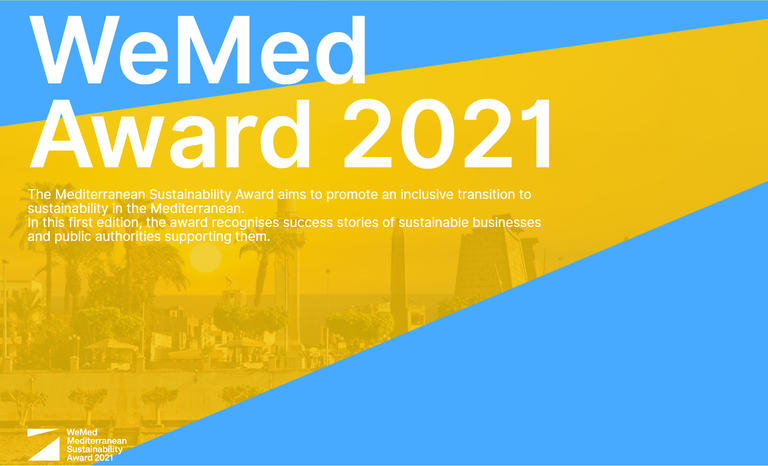
WEMED AWARD: MEET THE JURY THAT WILL EVALUATE THE APPLICATIONS
The call for applications to the first edition of the Mediterranean Sustainability Award (WeMed) closed on 15 July 2021. Now SCP/RAC has started the evaluation process to select the three final winners.
The call for applications to the first edition of the Mediterranean Sustainability Award (WeMed) closed on 15 July 2021. Now SCP/RAC has started the evaluation process to select the three final winners.
Who is the 2021 WeMed Award Jury Members? ...
The call for applications to the first edition of the Mediterranean Sustainability Award (WeMed) closed on 15 July 2021. Now SCP/RAC has started the evaluation process to select the three final winners.
Who is the 2021 WeMed Award Jury Members?
The WeMed Jury consists of seven international experts on green and circular economy entrepreneurship, policies and financing. The Jury members are:
- Jihen Boutiba, the General Secretary of the Union of Mediterranean Confederations of Enterprises (BUSINESSMED), based in Tunis.
- Mounir Temmam, Senior expert in evaluation of public policies in the environmental field at Enviro Consulting International, based in Rabat.
- Maya Karkour, Environmental and Circular Economy Specialist at EcoConsulting and the Circular Hub, based in Beirut.
- Pilar Chiva, Head of the Circular Economy Area at the Waste Agency of Catalonia, considered a reference in waste prevention and management and the promotion of circular economy, based in Barcelona.
- Ramon Farreny, Circular Economy and Green Entrepreneurship specialist at Inèdit, a strategical eco-innovation studio working towards the transition to a smart, prosperous and sustainable future, based in Barcelona.
- Zoé Luçon, Senior expert in sustainable investment and impact measurement at ANIMA Investment Network and THE NEXT SOCIETY, based in Marseille.
- Giorgio Mosangini, Team Leader of the Green Entrepreneurship & Civil Society Area at the Regional Activity Centre for Sustainable Consumption and Production (SCP/RAC).
You can find out more about their experience and prestigious institutions in the WeMed Award website.
How the WeMed evaluation process works?
First of all, the WeMed Award Secretariat, SCP/RAC, will do a first screening to identify applications that meet all the required eligibility criteria. Then, the SCP/RAC team will do an in-depth evaluation of all pre-selected applications based on detailed evaluation criteria for each category (in particular, the environmental, social and economic impact of Sustainable Business Models and the performance monitoring, sustainable funding and participatory approach of Public Authorities initiatives).
Based on the number of points obtained, the top 10 applications from each category (A.1 Early Stage Business Models, A.2 Growth Stage Business Models and B. Public Authorities) will be selected as finalists and will be submitted to the WeMed Award Jury. The Jury Members will assess the applications separately and then will meet during the first half of September to select the final winners of each category together. The names will be announced at the WeMed Award Ceremony that will take place in October 2021. You can subscribe to the WeMed Award newsletter to stay updated on the final date of the Ceremony.
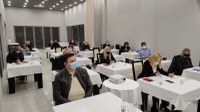
CLOSING THE GAP OF NATIONAL CONTINGENCY PLANS IN THE MEDITERRANEAN REGION – NATIONAL WORKSHOP IN BOSNIA AND HERZEGOVINA, NEUM, 27-28 APRIL 2021 – MAY 07, 2021
Between 27 and 29 April 2021, Neum, the only coastal town in Bosnia and Herzegovina, hosted two activities for the development of the National Contingency Plan (NCP) of Bosnia and Herzegovina, namely the National Workshop on Emergency Response to ...
Between 27 and 29 April 2021, Neum, the only coastal town in Bosnia and Herzegovina, hosted two activities for the development of the National Contingency Plan (NCP) of Bosnia and Herzegovina, namely the National Workshop on Emergency Response to marine pollution incidents at managerial level (27-28 April 2021), and the Meeting of competent authorities in charge of the the National Contingency Plan of Bosnia and Herzegovina (29 April 2021).
This activity is another demonstration of the integrated approach of the Mediterranean Action Plan of the United Nations Environment Programme (UNEP/MAP) and its Component. The development of the NCP, coordinated and led by the Regional Marine Pollution Emergency Response Centre for the Mediterranean Sea (REMPEC), is an integral part of the development of the Coastal Area Management Programme (CAMP) for Bosnia and Herzegovina. The CAMP project is being carried out within the framework of the Barcelona Convention, under the leadership of the Priority Actions Programme Regional Activity Centre (PAP/RAC).
The Workshop was attended by 18 participants comprising senior officials, managerial staff and administrators from state, federal, cantonal, and local authorities and services whose responsibilities include responding to civil emergencies and maritime affairs.
While the objective of the Workshop was to provide the necessary knowledge to enable them to take an active role in the next phases of the development of the NCP, the Meeting aimed at presenting the work plan for the development of the NCP, discussing the proposed outline of the plan, and agreeing upon the way forward for its implementation and completion.
The Meeting was chaired by a representative of the Ministry of Foreign Trade and External Relations of Bosnia and Herzegovina, which is the Lead Agency for CAMP Project and was addressed by the Head of Office of REMPEC in an introductory speech via Skype.
These events provided a better understanding of relevant state, federal and cantonal arrangements for civil emergencies, the relations among different authorities, and also provided useful inputs for the next phases of the project including the preparation of the draft National Contingency Plan of Bosnia and Herzegovina, the organisation of a two-day national exercise to test the first draft NCP followed by a meeting to review the draft NCP.
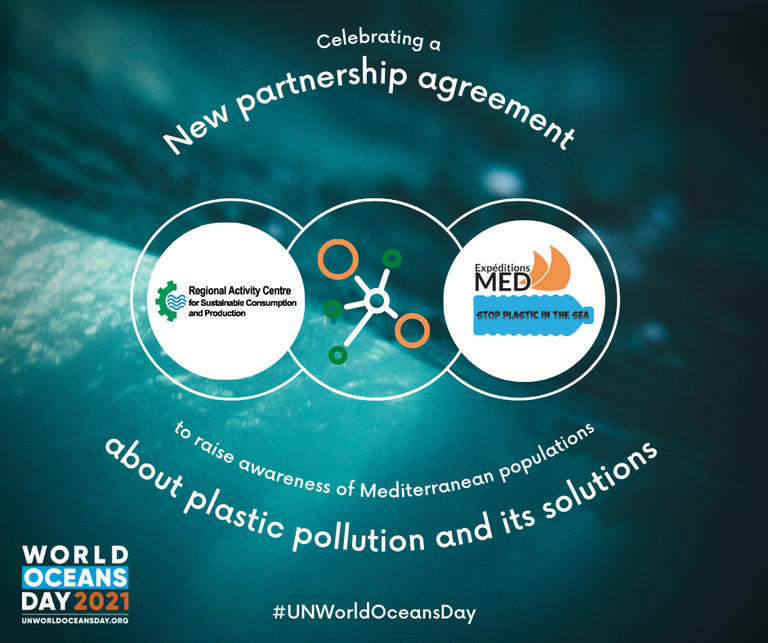
SCP/RAC AND EXPÉDITIONS MED SIGN A PARTNERSHIP AGREEMENT TO FIGHT AGAINST PLASTIC POLLUTION IN THE MEDITERRANEAN
A new promising partnership was signed on May 20, 2021 between Expeditions MED association and the Regional Activity Center for Sustainable Consumption and Production (SCP/RAC) to join forces to address the environmental, social and economic ...
A new promising partnership was signed on May 20, 2021 between Expeditions MED association and the Regional Activity Center for Sustainable Consumption and Production (SCP/RAC) to join forces to address the environmental, social and economic challenges related to plastic pollution in the Mediterranean.
Through this partnership, the two organizations will increase the impact of their respective actions to fight against marine litter and promote local, eco-innovative solutions.
Expedition MED develops travelling exhibitions as part of its pilot program "Plastic Free Mediterranean Sea - Exhibitions for Education", with three partner countries: Morocco, Algeria and Italy. These touring activities track and record the sources, origins and impacts of plastic waste and present sustainable solutions adapted to partner countries.
This collaboration focuses, for these exhibitions, on the creation of content promoting eco-innovative solutions in the fight against pollution by plastic waste for each country. The main objective is to raise public awareness in the Mediterranean in order to better know and tackle the challenges of plastic pollution.
SCP/RAC, through its medium-term strategy on plastics, intends to reduce and prevent plastic pollution, decreasing the toxicity and increasing the sustainability of plastics, strengthening the use of life cycle thinking and supporting eco-innovation.
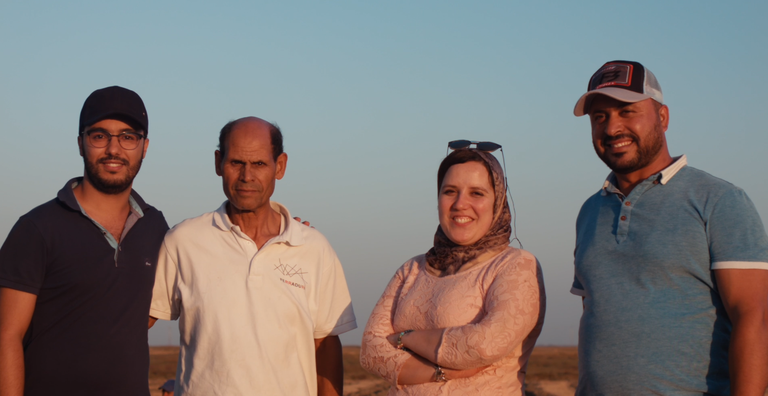
OPENING OF THE CALLS FOR APPLICATIONS OF SWITCHMED GREEN ENTREPRENEURSHIP PROGRAMME: HOW SCP/RAC IS PROMOTING A TRANSITION TO CIRCULAR ECONOMY IN 8 SOUTHERN MEDITERRANEAN COUNTRIES
SCP/RAC and the Switchers Support National Partnerships launch calls for applications for green entrepreneurs. These unique opportunities will enable selected candidates to benefit from a set of business development methodologies boosting sustainability and circular economy.
SCP/RAC and the Switchers Support National Partnerships launch calls for applications for green entrepreneurs. These unique opportunities will enable selected candidates to benefit from a set of business development methodologies boosting ...
SCP/RAC and the Switchers Support National Partnerships launch calls for applications for green entrepreneurs. These unique opportunities will enable selected candidates to benefit from a set of business development methodologies boosting sustainability and circular economy.
In line with its mission to promote circular economy, the Regional Activity Centre for Sustainable Consumption and Production (SCP/RAC) of the United Nations Environment Programme Mediterranean Action Plan (UNEP/MAP) is supporting green entrepreneurs to accelerate the shift to more sustainable consumption and production patterns. The opening of the calls for applications of the Green Entrepreneurship programme that SCP/RAC is leading within the framework of the EU-funded SwitchMed programme is aiming to achieve this objective.
The Switchers Support National Partnerships (the local networks of Business Support Organizations gathered in partnerships and implementing the Green Entrepreneurship programme at the local level) and SCP/RAC are opening such opportunities to support green entrepreneurs from the 8 Southern Mediterranean countries in which SwitchMed is implemented (namely Algeria, Egypt, Israel, Jordan, Lebanon, Morocco, Palestine and Tunisia) develop their sustainable businesses. In this first phase, the successful applicants that will have the chance to be selected will receive a tailored training to develop:
– their green business models: for those at ideation stage, that is to say the innovators who have an idea of green business;
– their green business plans: for those at early stage, that is to say the green entrepreneurs who have already started their activity but are at its beginning.
The implementation of this activity is a crucial step of the Green Entrepreneurship programme. It follows the completion of the Trainings of Trainers, who were coached to transfer SCP/RAC cutting-edge tools and methodologies to future beneficiary entrepreneurs, including through the use of the recently lunched platform TheSwitchers.org.
So far, five countries have opened their calls for applications and trainings have started. The calls to select Lebanese and Tunisian green entrepreneurs have already closed but those of Israel, Morocco and Palestine are still running. The remaining three countries are expected to open their calls in the months to come.
The applicants have first to register to the platform and apply to the dedicated section.
With the goal of promoting eco-innovation among youth and contributing to the reduction of youth unemployment, young people will be one of the main targets (along with women) of the trainings for the Green Business Model development. Through SwitchMed Phase I (2013-2018) and the local partners’ commitment, 2 201 green entrepreneurs (38% women) had been trained and supported to develop their green business models across the southern Mediterranean.
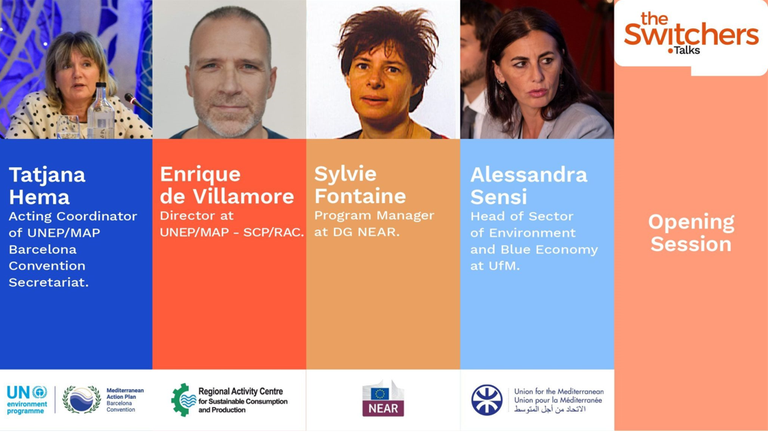
THE SWITCHERS TALKS”, THE FIRST ONLINE EVENT TAILORED FOR THE SWITCHERS COMMUNITY AND GREEN ENTREPRENEURS
The Switchers Community gathered in a two-day online meeting to explore how the community can achieve a stronger impact in terms of visibility, advocacy and knowledge transfer and which are the key strategies for its future development.
Who are ...
The Switchers Community gathered in a two-day online meeting to explore how the community can achieve a stronger impact in terms of visibility, advocacy and knowledge transfer and which are the key strategies for its future development.
Who are The Switchers? The Switchers is a community of 400 inspiring green entrepreneurs and change makers in the Mediterranean region, implementing eco-innovative solutions that contribute to sustainable and fair consumption and production models. The community was developed by the Regional Activity Centre for Sustainable Consumption and Production (SCP/RAC) of UNEP/MAP and started within the framework of the EU-funded SwitchMed programme. Since 2019, the Switchers has become an independent initiative, leading to the creation of the Switchers Support Programme; thus positioning UNEP/MAP-SCP/RAC as a main catalyser of green innovation and green employment as strategic sectors for Green and Blue Economy in the Mediterranean region.
on June 28 and 29, The Switchers met for the first edition of “The Switchers Talks”, an event specially designed for them with the main goal of fostering the discussion on how this community should evolve to be more impactful and to better offer business opportunities to the community members.
The first day of the event was only open to the Switchers while the second opened its doors to the public, offering a Master Class jointly organized with EVPA, Investing for Impact and a series of workshops.
On the first day, Switchers from Egypt, Algeria, Morocco, Jordan and Palestine interacted, shared their experiences and reflected on organization mechanisms, services and communication strategies for communities with different experts.
On the second day, the EVPA-SCP/RAC joint Master Class focused on impact investing for sustainable businesses, hosting investors and philanthropists who “pitched” their financial missions and objectives to green entrepreneurs, giving insightful details to access impact investment in the Region. Three simultaneous workshops were also hosted and attendees had the chance to hear from nine different experts on : Digital Marketing and Sustainable Branding, Nature-based Solutions and The Community Digital Support.
The 2nd day was marked by the high-level panel of speakers welcoming the work and actions of the Switchers in the region: Tatjana Hema, acting coordinator of UNEP/MAP - Barcelona Convention Secretariat addressed first, followed by Enrique de Villamore, director of SCP/RAC; Sylvie Fontaine, Program manager at DG NEAR and Alessandra Sensi, Head of sector of Environment and Blue Economy at Union for Mediterranean (UfM).
The representatives of the 4 institutions highlighted the importance of the role of the Switchers in the region and recognized that their efforts contribute to initiate the transformational changes needed for a green renaissance in the Mediterranean, paving the way for a prosperous and regenerative circular economy in the region.
Capacitating green entrepreneurs and eco-innovation is a key element to embrace a journey towards a healthier Mediterranean, thus the promotion of green jobs, green entrepreneurs and eco-innovation is identified as Strategic Objective of the Mediterranean Strategy for Sustainable Development.
In a nutshell, a total of approximately 100 participants joined the virtual event organised by the Regional Activity Centre for Sustainable Consumption and Production (SCP/RAC). The event set the lines for the next years and helped to build a bigger, stronger and more united community of change-makers, in line with the region’s ambitions.

MULTIPLE RED FLAG
On the occasion of the International Day of Biodiversity, UNEP / MAP has dedicated several articles in order to mark the 2021 edition of this event.
Two reports supported by the UNEP/MAP-Barcelona Convention System provided new insights on the extent of impact from the pollution, climate change and biodiversity loss, observed in the Mediterranean.
Indeed, the State of the Environment and ...
Two reports supported by the UNEP/MAP-Barcelona Convention System provided new insights on the extent of impact from the pollution, climate change and biodiversity loss, observed in the Mediterranean.
Indeed, the State of the Environment and Development (SoED) report, produced by Plan Bleu, a UNEP/MAP Regional Activity Centre based in France, revealed that the Mediterranean is not on track to achieving the Sustainable Development Goals (SDGs) by 2030, and warns that biodiversity loss, the growing impact of climate change and unrelenting pressure on ecosystems from economic sectors can lead to irreversible environmental damage in the basin, while the first Mediterranean Assessment Report (MAR 1) produced by MedECC, an independent science network that the UNEP/MAP-Barcelona Convention system supports, highlighted on “Climate and Environmental Change – Current Situation and Risks for the Future”, pointing in this way on very important impacts affecting both natural and socio-economic systems in a basin that is warming 20 per cent faster than the global average. 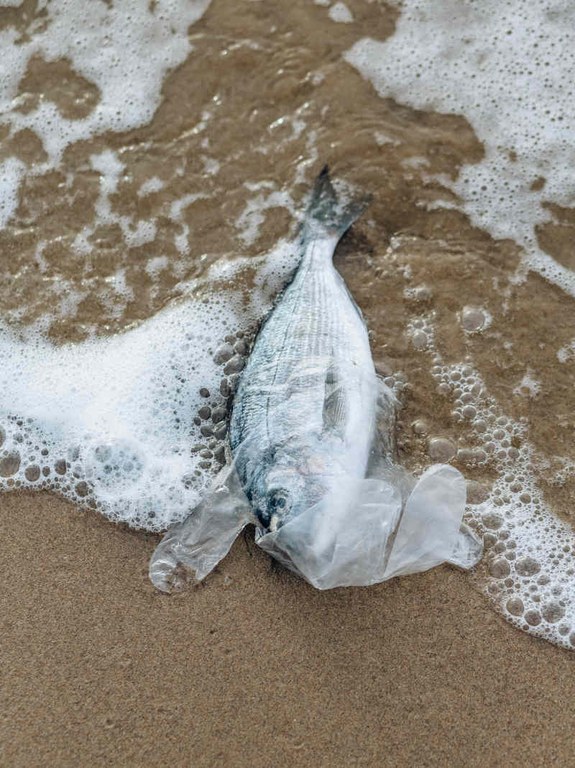
Both reports have raised multiple red flags on biodiversity in the Mediterranean, in particular the rapid extinction of Posidonia oceanica meadows, a Mediterranean-endemic marine vegetation species, that is one of the most eloquent symptoms of the unfolding crisis of biodiversity loss in the basin. Indeed, according to the IPCC, around 70 per cent of habitat loss of Posidonia oceanica is projected by 2050 with a potential for functional extinction by 2100.
The set of information provided by the both Reports confirms the urgent necessity of green renaissance in the Mediterranean, which would recognize and address the root causes of this triple crisis due to pollution, biodiversity loss and climate change.
The recovery from the pandemic implies a mobilization of resources and investment decisions at all levels but also offers the opportunity of a compliant implementation to the Barcelona Convention and its Protocols. This would enable a much-needed acceleration of biodiversity conservation efforts, especially under the Specially Protected Areas and Biological Diversity (SPA/BD) Protocol.

THE MEDITERRANEAN BLUEPRINT
On the occasion of the International Day of Biodiversity, UNEP / MAP has dedicated several articles in order to mark the 2021 edition of this event.
The Mediterranean countries already have a blueprint for biodiversity conservation in the Mediterranean. Indeed, under the Barcelona Convention, the Contracting Parties have signed up to a substantial development of the normative framework on ...
The Mediterranean countries already have a blueprint for biodiversity conservation in the Mediterranean. Indeed, under the Barcelona Convention, the Contracting Parties have signed up to a substantial development of the normative framework on biodiversity conservation in the Mediterranean. In addition to the SPA/BD Protocol, the Contractiong Parties have adopted more than twenty strategies, action plans and regulatory measures—several of which are legally binding—covering threatened species of fauna and flora as well as key natural habitats.
These legal above-indicated instrument have been developed by SPA/RAC, the Regional Activity Centre of UNEP/MAP working on biodiversity and specially protected areas and aligne with global commitments under the Convention on Biological Diversity (CBD), constituting a ready-made blueprint in order to mending the dysfunctional relationship between humans and nature in the Mediterranean region.
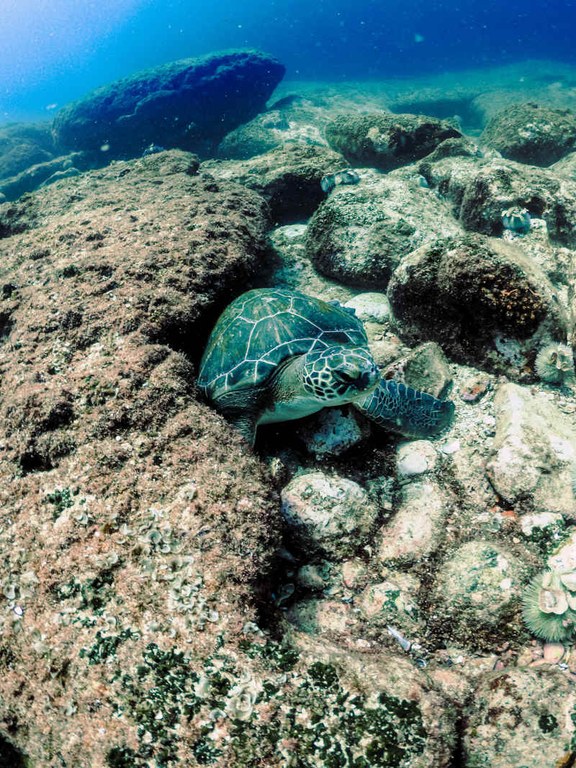 An important element of the regional conservation blueprint devised under the Barcelona Convention for the Mediterranean, namely the post-2020 Strategic Action Programme for the Conservation of the Biological Diversity and sustainable use of natural resources in the Mediterranean Region (post-2020 SAPBIO), will be examined during this year by the Contracting Parties at their COP 22, scheduled in December in Antalya, Turkey. The post-2020 SAPBIO draft recommend nature-based solutions as tools to improve the health of ecosystems and promote sustainability in key sectors of Mediterranean economies, including aquaculture. Once adopted, the post-2020 SAPBIO should give priority to the planning of urgent actions at the regional and national levels for the sustainable management of Mediterranean biodiversity until 2030.
An important element of the regional conservation blueprint devised under the Barcelona Convention for the Mediterranean, namely the post-2020 Strategic Action Programme for the Conservation of the Biological Diversity and sustainable use of natural resources in the Mediterranean Region (post-2020 SAPBIO), will be examined during this year by the Contracting Parties at their COP 22, scheduled in December in Antalya, Turkey. The post-2020 SAPBIO draft recommend nature-based solutions as tools to improve the health of ecosystems and promote sustainability in key sectors of Mediterranean economies, including aquaculture. Once adopted, the post-2020 SAPBIO should give priority to the planning of urgent actions at the regional and national levels for the sustainable management of Mediterranean biodiversity until 2030.

UNDERSTAND TO PROTECT
On the occasion of the International Day of Biodiversity, UNEP / MAP has dedicated several articles in order to mark the 2021 edition of this event.
It is essential to have a good understanding of the nature before developing strategies, action plans and other conservation measures. Collecting data on marine and coastal ecosystems and processes, in an integrated methodical manner and according ...
It is essential to have a good understanding of the nature before developing strategies, action plans and other conservation measures. Collecting data on marine and coastal ecosystems and processes, in an integrated methodical manner and according to harmonized standards, is a prerequisite to achieve and maintain a Good Environmental Status.
Since the adoption of the Ecosystem Approach (EcAp) roadmap in 2008, several initiatives have been undertaken to mainstream the implementation of the Integrated Monitoring and Assessment Programme (IMAP) in the Mediterranean. This has led to significant progress in decision-making regarding biodiversity conservation . IMAP-MPA and EcAp MED III, two EU-funded projects implemented by UNEP/MAP and two of its Components, namely SPA/RAC and MED POL, are bolstering action in this field. 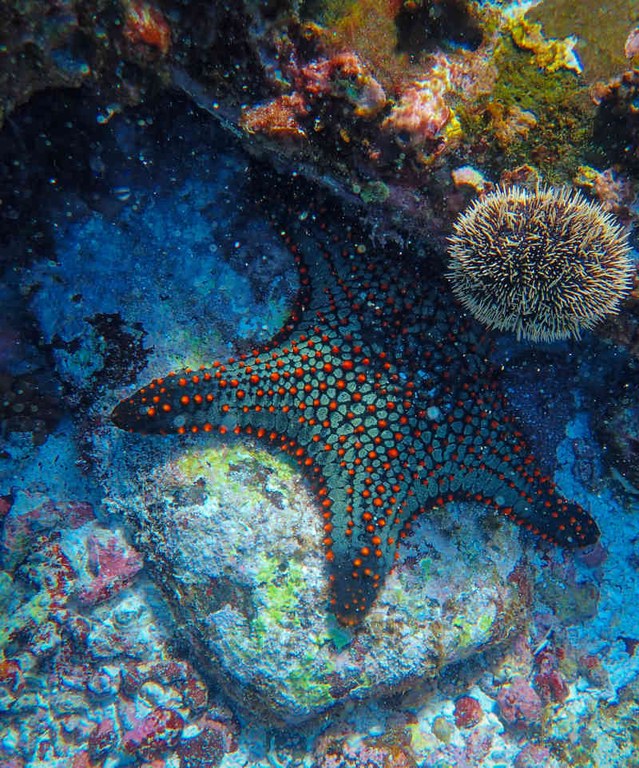
Another project, denominated GEF Adriatic, have been implemented by UNEP/MAP, two of its Regional Activity Centres (PAP/RAC and SPA/RAC) and the national Institutions from Albania and Montenegro. This project was instrumental in the development of national Integrated Monitoring and Assessment Programmes in the two countries. The first integrated assessments in selected areas led to a better understanding of marine and coastal ecosystems and to propose appropriate conservation measures.
Surveys in Boka Kotorska Bay (Montenegro), conducted by PAP/RAC, SPA/RAC, the Institute of Marine Biology with the public enterprise Morsko Dobro, the National Agency for Nature and Environment Protection and the Ministry of Ecology, Spatial Planning and Urbanism, have provided the basis upon which the protection of the Sopot and Drazin Vrt sites was initiated. These sites host a rare species of coral that, with a lifespan of 2,700 years, is among the oldest living organisms on the planet.

NATURE-BASED SOLUTIONS FOR MARINE AND COASTAL PROTECTED AREAS (MCPAs)
On the occasion of the International Day of Biodiversity, UNEP / MAP has dedicated several articles in order to mark the 2021 edition of this event.
Last year, Plan Bleu, the France-based Regional Activity Centre of UNEP/MAP, published a policy paper titled “Enhancing the Mediterranean’s climate resilience through Nature-based Solutions”. This document explores the differents ways to exploit ...
Last year, Plan Bleu, the France-based Regional Activity Centre of UNEP/MAP, published a policy paper titled “Enhancing the Mediterranean’s climate resilience through Nature-based Solutions”. This document explores the differents ways to exploit nature-based solutions, like the services and resources provided by ecosystems and biodiversity, to enhance climate resilience.
Nature-based solutions are at the heart of many of the instruments developed under the Barcelona Convention. It is the case of Marine and Coastal Protected Areas (MCPAs) that offer a respite to the nature because humans let it do what it does best: self-healing.
MCPAs offer nature-based Solutions to support climate change adaptation and mitigation. By preserving marine biodiversity, MCPAs strengthen the resilience of marine ecosystems to global warming and other stressors. For instance, MPCAs play a very important role in protecting Posidonia oceanica meadows, which constitute an important carbon sink and buffer against sea acidification.
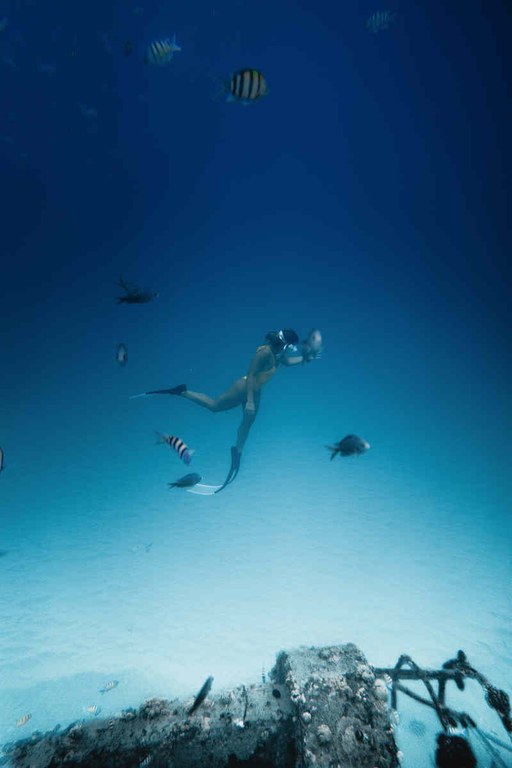 Under the SPA/BD Protocol, the Contracting Parties to the Barcelona Convention have established a growing network of Specially Protected Areas of Mediterranean Importance (SPAMIs). There are currently 39 areas included in the SPAMI List from a total of 1,126 Marine and Coastal Protected Areas (MCPAs) covering 209,303 km2. This coverage amounts to approximately 8.3 percent of the Mediterranean Sea area, with strictly protected areas representing a paltry 0.06 per cent.
Under the SPA/BD Protocol, the Contracting Parties to the Barcelona Convention have established a growing network of Specially Protected Areas of Mediterranean Importance (SPAMIs). There are currently 39 areas included in the SPAMI List from a total of 1,126 Marine and Coastal Protected Areas (MCPAs) covering 209,303 km2. This coverage amounts to approximately 8.3 percent of the Mediterranean Sea area, with strictly protected areas representing a paltry 0.06 per cent.
Additional efforts are sorely needed to improve the management of MCPAs so as to meet the Aichi target 11 and the forthcoming 2030 target under the Convention on Biological Diversity (CBD). This goal is enshrined in the post-2020 Regional Strategy for Marine and Coastal Protected Areas (MCPAs) and Other Effective area-based Conservation Measures (OECMs), prepared by SPA/RAC and will be examined alongside the post-2020 SAPBIO by the Contracting Parties at COP 22.
